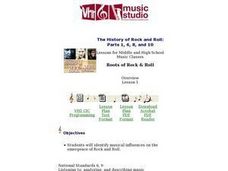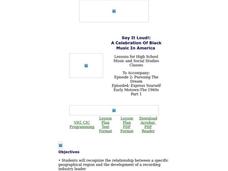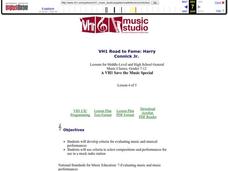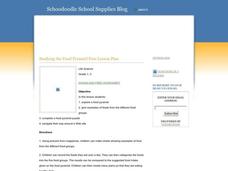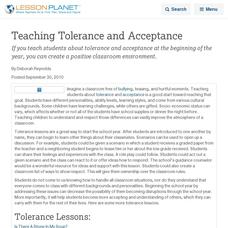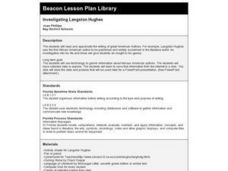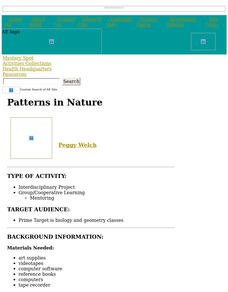Curated OER
The History of Rock and Roll: Parts 1, 6, 8, and 10 Roots of Rock & Roll
Students examine the musical influences on the emergence of Rock and Roll.
Curated OER
Say It Loud!: A Celebration Of Black Music In America - Lesson 1
High schoolers identify many careers within the music industry such as producer, A&R representative and recording studio engineer. They connect achievements of noted artists with their roles in the music industry.
Curated OER
The Motown Dynasty (1969-1980) Part 2
Students connect achievements of noted artists with their roles in the music industry. They identify many Black music industry leaders and their contributions with the Motown Sound.
Curated OER
Say It Loud!: A Celebration Of Black Music In America
Pupils listen to a selection of early Berry Gordy songs and identify musical characteristics of Motown music and recognize the relationship between Detroit and the development of a recording industry leader.
Curated OER
Say It Loud!: A Celebration Of Black Music In America Music In America
Students study early New Orleans Jazz music and recognize Louis Armstrong as an early jazz artist. They recognize the elements and roots of Jazz.
Curated OER
VH1 Road to Fame: Harry Connick Jr.
Learners are divided into groups of employees of a jazz radio station and a classical radio station. They role play their own broadcasts.
Curated OER
VH1 Presents the 1980s - Lesson 3
Students identify different genres of music popular in the 1980s. They study musicians of the 1980s examples of the songs that they made popular. They utilize a worksheet imbedded in this plan to categorize the music.
University of South Carolina
Home Sweet Home
Fifth graders will research a biome (land or aquatic) and create a project (diorama, model or another idea of the student's choosing) which includes the geographic features of that biome as well as plants and animals found there and...
Curated OER
Food Pyramid
Learners examine the food pyramid. In this healthy diet lesson, students view the food pyramid and discuss healthy eating. Learners find examples of healthy food in magazines and share their findings. Students plan healthy means and...
Curated OER
A Small Book of Small Things
Students explore size relationships as they collect pictures of the small things in their world. In this early childhood math and literacy lesson, students gain an understanding of size differences and develop fine-motor and literacy...
Curated OER
Teaching Tolerance and Acceptance
If you teach students about tolerance and acceptance at the beginning of the year, you can create a positive classroom environment.
Curated OER
Our Classroom is a Community: LEAGUE Philanthropy Lesson
Students examine the concept of community. In this philanthropy lesson, students consider how their classroom could be considered a community and discuss how they can be philanthropists in their own classroom.
Curated OER
Weather "Whys" Lesson 2 Seasons
Students explore seasons. In this cross curriculum weather and seasons lesson, students identify characteristics of the four seasons and sequence related pictures. Students listen to poems and stories about trees in different...
Curated OER
Investigating Langston Hughes
Third graders read and appreciate the writing of great American Authors. use technology to garner information about famous American authors. They have selected sites to explore. The information they save be used for a future Powerpoint.
Curated OER
Patterns in Nature
Research patterns in nature which illustrate biological and mathematical concepts. Your class will discover and explore aspects of fractals, Fibonaccis numbers, whale and butterfly migration patterns, whale identification, flower...
Curated OER
Get in the Newspaper Habit
Dive into journalism with your high schoolers! The resources provided here will help your learners write unbiased, clear, and succinct newspaper articles. First they spend time sifting through stacks of articles, filling out a graphic...
Curated OER
Post-Nuclear War Survival
Students use critical thinking and discussion to solve a problempresented in a hypothetical dilemma.
Captain Planet Foundation
Sense of Place
Explore the five senses with a kindergarten lesson on gardening. After taking a walk through the class garden, kids note what they see, hear, feel, taste, and smell, and then decide what is living in the garden versus what is not living....
PBS
Stories of Painkiller Addiction: Prescription Drug Abuse Awareness Campaign
The I-STOP law was designed to regulate the distribution and tracking of prescription drugs. After reading an article about its signing and implementation, middle and high schoolers work together to come up with their own ideas for an...
Curated OER
Introduction to Flight: A Math, Science and Technology Integrated Project
Seventh graders review graphing procedures and practice locating points using x,y coordinates. Students calculate the areas of the top and bottom surfaces of the airfoil. They construct a test model of the airfoil.
MENSA Education & Research Foundation
Pi Day Fun!
In this multi-faceted introduction to pi, participants perform a bevy of pi-related activities. Ranging from measuring household items to singing pi songs and reading pi stories, this fun and non-intimidating resource serves to bring up...
Curated OER
Plagiarism
Don't get caught plagiarizing! Before starting your research unit, use this lesson to help your young writers identify plagiarism. The truth is, many kids don't even realize when they're doing it! They practice citing sources when...
Council for Economic Education
The Economics of Income: If You’re So Smart, Why Aren't You Rich?
If basketball players make more than teachers, why shouldn't learners all aspire to play in the NBA? Unraveling the cost and benefits of education and future economic success can be tricky. Economic data, real-life cases, and some...
Curated OER
Scientific Method Experiment: Factors Affecting How Ice Melts
Students demonstrate the scientific method by conducting an ice cube melting experiment. They make predictions and observations, and conclude what factors make ice melt more slowly or quickly than normal.
